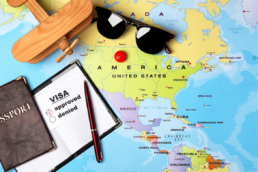
A federal judge in Seattle temporarily blocked enforcement of President Trump’s Executive Order limiting travel of certain foreign nationals to the U.S. The ruling was issued late Friday night, one week after Trump’s Executive Order was put into place.
Remind me again — what did the Executive Order state?
Trump’s Executive Order suspends admission of all refugees into the United States for 120 days. It also aims to implement “new vetting measures” to screen out “radical Islamic terrorists.” Refugee entry from Syria would be suspended indefinitely, and all travel from Syria and six other nations — Iran, Iraq, Libya, Somalia, Sudan and Yemen — is suspended for 90 days. Trump has verbally conveyed that he would give priority to Christian refugees over those of other religions.
Following the Order, protests occurred at airports nationwide, and lawsuits were triggered under the claim that the White House is violating due process and equal protection under the Constitution.
OK, so what does this latest ruling mean?
U.S. District Judge James L. Robart granted a request from lawyers for the state of Washington who had asked him to stop the government from acting on critical sections of Trump’s order. The lawsuit was the first to test the broad constitutionality of Trump’s executive order on a national basis. Judge Robart, a George W. Bush appointee, explicitly made his ruling apply across the country, while other judges in similar cases have so far issued orders concerning only specific individuals.
In his opinion, Judge Robart wrote that “fundamental” to the court’s work was “a vigilant recognition that it is but one of three equal branches of our federal government … The court concludes that the circumstances brought before it today are such that it must intervene to fulfill its constitutional role in our tri-part government.”
This ruling sets up a legal confrontation between the new president and the judicial branch. The ruling is temporary, and the ultimate question of whether Trump’s Executive Order will pass constitutional muster will fall to higher-level courts. Legal analysts have said the ban could be difficult to permanently undo because under current regulations, the president has broad authority to set immigration policy.
How does this ruling affect previously banned travelers?
According to U.S. officials, government authorities immediately communicated with airlines to allow U.S. travel by those who had been barred. Qatar Airways was the first to say it would allow passengers from Iran, Iraq, Libya, Somalia, Sudan, Syria and Yemen to resume flying to U.S. cities if they had valid documents. Fellow Gulf carriers Etihad and Emirates said they would do the same, as did others including British Airways, Air France, Spain’s Iberia and Germany’s Lufthansa.
The State Department immediately said that previously banned travelers will be allowed to enter the U.S., reversing the provisional revocation of visas. “Those individuals with visas that were not physically canceled may now travel if the visa is otherwise valid,” state officials said. Department of Homeland Security personnel will resume inspection of travelers in accordance with standard policy and procedure.
NOTE: Since it was first rolled out a week ago, the Order had been evolving. It was later clarified that green card holders from the affected countries, for example, are admissible to the U.S. without needing an approved waiver, as required when the order took effect. DHS also clarified that the order does not apply to dual citizens with passports from countries other than the seven listed.
Justice and State Department officials had revealed earlier Friday that about 60,000 — and possibly as many as 100,000 — visas already have been provisionally revoked as a result of Trump’s order. The revocations have no impact on the legal status of people already in the U.S, but if those people left the country, their visas would no longer be valid.
What does the White House think?
In response to the ruling, the White House said, “The president’s order is intended to protect the homeland and he has the constitutional authority and responsibility to protect the American people.”
The Trump administration said it would go to court as quickly as possible to dissolve Robart’s order, and that it would immediately file for an emergency stay.
Berardi Immigration Law will continue to monitor the rulings on President Trump’s Executive Order and continue to provide updates.
Ready to have Berardi on your side?
Whether you’re a business looking to hire or a professional hoping to relocate, immigration law can be complicated. But you don’t have to do it alone. Put our experience to work for you.


